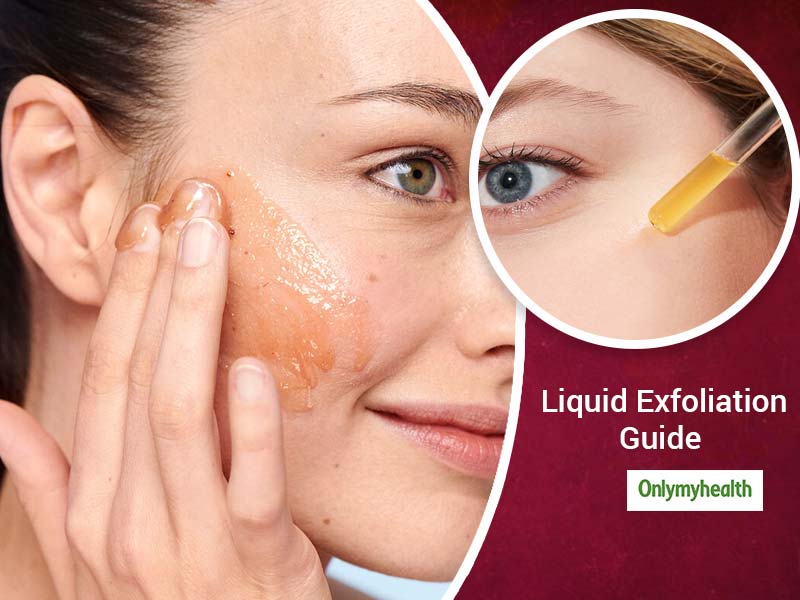
Skin exfoliation is one of the main steps of skincare. Though this doesn’t need to be done regularly as cleansing and toning, it still remains an important part of skincare and skin health. In general, most of us know and use conventional exfoliants like face scrubs but there is a lot more to explore in skin exfoliation. Skin exfoliation procedure is categorized into two parts: Mechanical and Chemical.
Table of Content:-
Regular scrubs and other physical methods of scrubbing come under mechanical exfoliation. What we generally do at home and salon treatments is mechanical exfoliation. On the other hand, chemical exfoliation involves liquid chemical exfoliants like chemical peel, AHAs, and BHAs. Here is the beginner guide for liquid exfoliation with expert views.
What is a liquid exfoliant?
Liquid exfoliants are chemical exfoliants with acidic composition. They have AHAs and BHA which are active ingredients to remove the deepest dead skin cells layer and expose the soft and radiant skin. These are more effective than physical exfoliants like scrubs but they are also handled with care. You cannot use them as regularly as you would your physical exfoliants like homemade walnut scrub cum face pack for their sensitive chemical composition. Also, you should consult your derma before using these as he/she can guide you better on which one to choose.
Is Liquid Exfoliant Safe For Skin?
Dr. Ajay Rana, a Renowned Dermatologist says,"Liquid or Chemical exfoliators are safe to use. Liquid exfoliators actually tend to be gentler on the skin than physical exfoliants. Chemical exfoliators work by improving the skin texture by breaking the bonds between the superficial dead skin cell layers and exfoliating them; and also improves the skin colour by guiding the skin cells to distribute skin pigment melanin in a uniform way. So the overall result is a much smoother and lighter skin!!"
The ‘acid’ word might have scared you but that’s not to be taken negatively. If used rightly, there is nothing better than a chemical liquid exfoliator for your skin. A physical exfoliator works only on the outermost surface but a chemical exfoliator acts on the deepest dead skin cell layer to improve your skin’s texture and bring a healthy glow.
Also Read: How Many Times Should You Exfoliate Your Face? Know From Dermatologist
AHAs and BHAs

- AHAs- Alpha-hydroxy acids
- BHAs- Beta-hydroxy acids
AHAs are water-soluble whereas BHAs are oil soluble. AHAs are better to destroy dead cells by loosening their bond and BHAs are good to correct complexion as they can penetrate into the skin to do the cleaning. Despite, their functioning is different, they can also be used together as the target is the same. You will get soft, spotless and youthful skin after using these together.
Skincare Benefits of Chemical Exfoliators
Almost every luxury skincare brand is launching its AHAs and BHAs line of products as these drive a lot more skin benefits than natural exfoliators. These not only target dead cells but also uneven tone, spots, blemishes, pigmentation, skin loosening, etc. Beauty bloggers are also promoting chemical exfoliators for their mind-blowing results. For a beautiful skin, you should also practice these night skin care rituals.

How to Exfoliate Safely by Skin Type
They are made differently to cater to different skin problems. Here is a list of acids that are present in chemical exfoliators. One should check out the ingredients as per their skin complaint.
- Lactic acid: Mild exfoliation and hydration.
- Salicylic acid: Anti-inflammatory and anti-bacterial.
- Glycolic acid: Strong exfoliation.
- Kojic acid: Good to treat pigmentation.
- Mandelic acid: Apt for acne and pigmentation issues.
Also Read: Beauty Guru Dr. Blossom Kochhar Give Tips On Grooming, Skincare and Hair Hacks

Beginner Guide To Liquid Exfoliation
Here are some things to note before starting.
- Always begin with Lactic acid as it is the mildest of them all.
- Do a patch test on your neck to see how your skin is reacting to the formula.
- If you get bumps and burns, discontinue the use and consult your dermatologist to identify the problem.
- In the beginning, use chemical exfoliants only once a week. Since, these alter pH levels, allow some time to your skin to get used to the change.
- Using a Sunscreen becomes a must when you use chemical exfoliators as these make the skin sensitive to UV rays.
Read More in Skin Care
How we keep this article up to date:
We work with experts and keep a close eye on the latest in health and wellness. Whenever there is a new research or helpful information, we update our articles with accurate and useful advice.
Current Version
